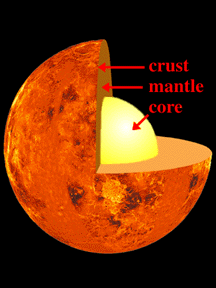The density of Venus is 5.204 grams per cubic centimeter.
Need some kind of comparison? The density of Earth is 5.515 g/cm
3
. So Venus is definitely less dense than Earth. And it's even less dense than Mercury. Of course, it's much more dense than any of the outer planets, like Jupiter or Saturn.
Scientists think that Venus has an interior structure similar to Earth, with a metal core, rocky mantle, and an outer crust. But these assumptions come purely from the density calculations. Here on Earth, scientists study the interior structure of the planet by using seismographs, and studying how seismic waves from earthquakes travel through the Earth. Since the surface of Venus is hot enough to melt lead, there's no way to leave scientific equipment on the surface for any period of time to study the interior of the planet.
With its lower density, Venus has a lower mass than Earth. In fact, the mass of Venus is only about 81% the mass of Earth. And it's also a little smaller than Earth. This means that the surface gravity of Venus is only 90% of what you would experience on Earth.
We have written many articles about Venus for Universe Today. Here's an article about
Venus' wet, volcanic past
, and here's an article about how Venus
might have had continents and oceans
in the ancient past.
Want more information on Venus? Here's a link to
Hubblesite's News Releases about Venus
, and here's
NASA's Solar System Exploration Guide
to Venus.
We have recorded a whole episode of Astronomy Cast that's only about planet Venus. Listen to it here,
Episode 50: Venus
.
 Universe Today
Universe Today
